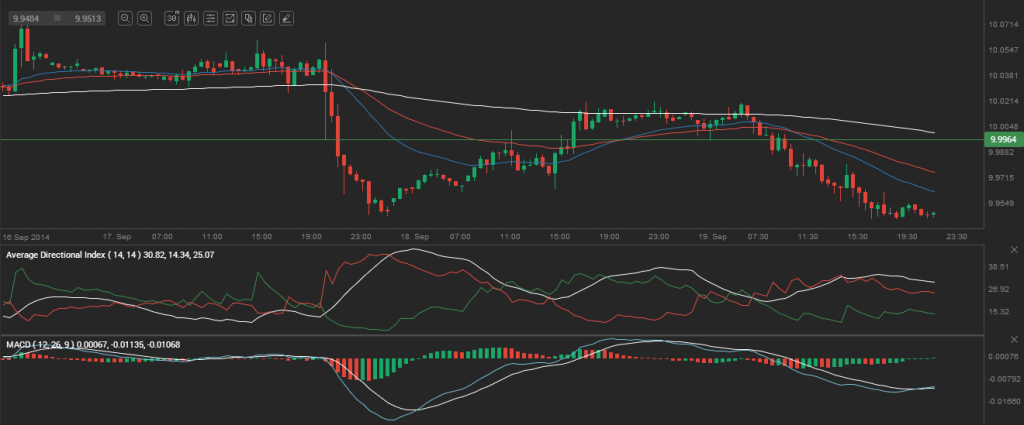Friday’s trade saw EUR/HKD within the range of 9.9408-10.0211. The pair closed at 9.9439, losing 0.72% on a daily basis and 1.04% for the whole week.
Fundamental view
Euro zone
Italian Industrial New Orders
At 8:00 GMT Italy’s National Institute of Statistics is expected to release a report on industrial new orders in July. The annualized new orders (without a seasonal adjustment) dropped 2.5% in June, while in monthly terms the indicator registered a 2.1% decrease. It measures the change in value of new orders, received by industrial sector companies, for delivering a variety of products. Only enterprises with over 20 employees are included in the survey. New orders are closely related with future industrial activity. In case the indicator drops in value, this might have a limited bearish effect on the euro.
Euro zone Consumer Sentiment
Sentiment in the Euro region probably continued to worsen in September, with the corresponding index coming in at a reading of -10.75, according to the median forecast by experts. In August the index stood at -10, which has been the lowest level since February.
The Economic Sentiment Indicator (ESI) reflects the level of optimism, which consumers have about economic development. The survey is conducted by phone and includes 23 000 households in the Euro zone. The questions asked stress on current economic and financial situation, savings intention and also on expected developments regarding consumer price indexes, general economic situation and major purchases of durable goods. The indicator measures consumer confidence on a scale of -100 to +100. A reading of -100 suggests a lack of confidence, zero means neutrality and a reading of +100 indicates extreme levels of confidence. Lower confidence usually implies lesser willingness to spend, including large-ticket purchases, while consumer spending is a key factor behind economic growth. Therefore, in case the ESI fell more than anticipated, this would mount selling pressure on the euro. The European Commission is expected to release the preliminary reading at 14:00 GMT.
Hong Kong
Consumer inflation
The annualized index of consumer prices (CPI) in Hong Kong probably accelerated to 4.45% in August from 4% in June, as the latter has been the highest level since January. Prices of electricity, gas and water surged at an annualized rate of 24.8% in July, mostly because some households had used up the full amount of Government’s one-off electricity charge subsidy, according to the Census and Statistics Department. Prices of alcoholic drinks and tobacco rose 7.0%, because of the increase of tobacco duty. Costs of housing climbed 4.6%, costs of meals bought away from home – 4.4%, while food prices (excluding meals bought away from home) were up 3.5%. At the same time, prices of durable goods dropped 3.1%.
The CPI is based on a monthly survey and represents a sample of 980 consumer goods and services classified into 9 major groups. Main categories include Housing sector (accounting for 31.6% of total weight), Food (27.5%) and Miscellaneous Services such as education, communications, information and medical care (15.9%). Transport comprises 8.5% of the total index, Durable Goods – 5.2%, Miscellaneous Goods – 4.2% and Clothing and Footwear – 3.4%.
In case the CPI increased more than anticipated, this would have a bullish effect on the local currency. Hong Kongs Census and Statistics Department is to release the official CPI report at 8:30 GMT.
Current Account
The deficit on Hong Kongs current account probably shrank to 4.5 billion HKD during the second quarter of the year from a deficit of 6.23 billion HKD in Q1.
The current account reflects the difference between a nation’s savings and its investments. It is the sum of the balance of trade, net current transfers (cash transfers) and net income from abroad (earnings from investments made abroad plus money sent by individuals working abroad to their families back home, minus payments made to foreign investors).
A current account surplus indicates that a country’s net foreign assets have increased by the respective amount, while a deficit suggests the opposite. A country with a surplus on its current account is considered as a net lender to the rest of the world, while a current account deficit puts it in the position of a net borrower. A net lender is consuming less than it is producing, which means it is saving and those savings are being invested abroad, or foreign assets are created. A net borrower is consuming more than it is producing, which means that other countries are lending it their savings, or foreign liabilities are created. Therefore, an expanding surplus or a contracting deficit on the current account of a nation usually has a bullish effect on its currency.
Hong Kongs Census and Statistics Department is expected to release the official data at 8:30 GMT.
Technical view
According to Binary Tribune’s daily analysis, the central pivot point for the pair is at 9.9686. In case EUR/HKD manages to breach the first resistance level at 9.9964, it will probably continue up to test 10.0489. In case the second key resistance is broken, the pair will probably attempt to advance to 10.0767.
If EUR/HKD manages to breach the first key support at 9.9161, it will probably continue to slide and test 9.8883. With this second key support broken, the movement to the downside will probably continue to 9.8358.
The mid-Pivot levels for Monday are as follows: M1 – 9.8621, M2 – 9.9022, M3 – 9.9424, M4 – 9.9825, M5 – 10.0227, M6 – 10.0628.
In weekly terms, the central pivot point is at 9.9855. The three key resistance levels are as follows: R1 – 10.0302, R2 – 10.1165, R3 – 10.1612. The three key support levels are: S1 – 9.8992, S2 – 9.8545, S3 – 9.7682.






